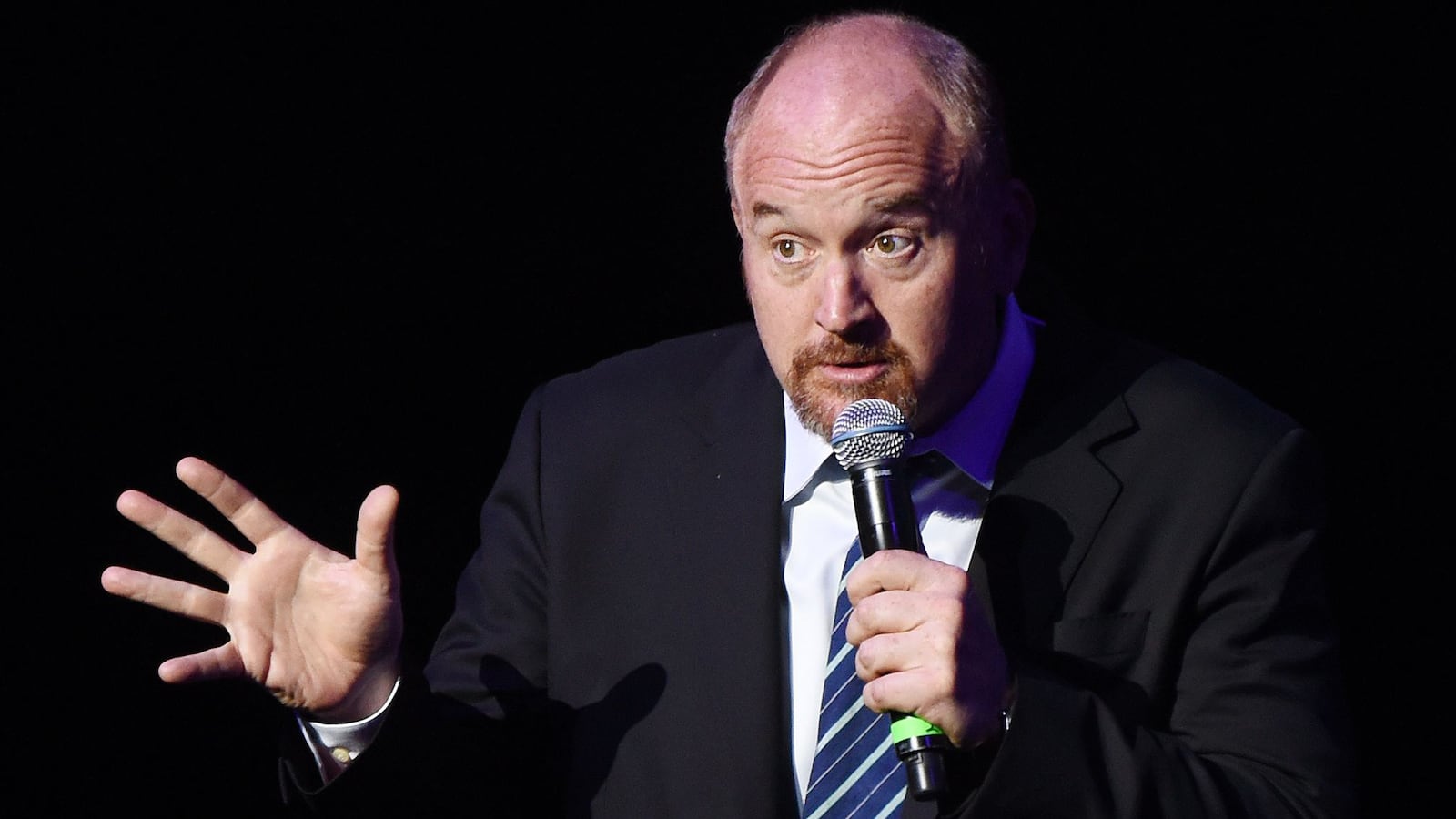“For those of you tuning in to see my interview with Louis C.K. tonight, I have some bad news,” Stephen Colbert said during his Late Show monologue last week. “Louis canceled his appearance here tonight because The New York Times broke this story today: Five women are accusing Louis C.K. of sexual misconduct. When reached for comment, Jesus said, ‘La-la-la-la-la. I don’t want to hear about it, I was a big fan!’”
That was pretty much it when it comes to late-night jokes about C.K., following his admission of guilt in response to the Times piece that detailed his years of sexually harassing women by masturbating in front of them. That evening, only Trevor Noah and Jordan Klepper chimed in with tame shots at C.K.—which is understandable, because the late-night landscape is littered with straight, white male comedians. It’s hard to imagine many of them going after their friend—a friend who also used to be their boss (C.K. was Colbert’s boss on The Dana Carvey Show) or co-worker (like Conan O’Brien on his NBC Late Night show, where C.K. served as a staff writer). Late-night has long been a white-male-dominated environment, with only comedians like Noah, Samantha Bee, Chelsea Handler and Robin Thede currently breaking that mold. It’s always been glaringly obvious, but it didn’t become straight-up detrimental until this year.
It seems that no one in late-night is equipped to comment on pop culture in the way that most have when it comes to Donald Trump. Impassioned speeches about Trump from Seth Meyers and cold opens from Saturday Night Live are commonplace, so much so that the approach has become predictable. It’s almost enough to make you forget that John Oliver made a mockery of Trump during the election with his “Make Donald Drumpf Again” campaign, Jimmy Fallon invited Trump on to play with his hair, and SNL used the candidate (who was well-established as a racist bigot at the time) to host their show and boost their ratings. Almost. But not quite. Sure, none of the rich white men hosting late-night would be particularly affected by Trump and his policies, but it feels cathartic to watch them hold Trump and his administration to the fire.
The late-night Resistance has also been pretty good for ratings, so it’s understandable why most shows have skewed political since the election. However, no one could’ve predicted that many of the things they railed against Trump for—like his sexual-assault allegations and abuse of power—would seep into the superfluous pop-culture stories they tackle each night. From Harvey Weinstein to Kevin Spacey to Louis C.K., it’s hard to find many pop-culture stories that aren’t directly dealing with sexual abuse and the systems that allow rich white men to get away with crimes for decades.
It’s a topic that deserves as much attention as these hosts have devoted to the Trump administration, but they are woefully ill-equipped to deal with it. When you benefit from the same system that allows Louis C.K. to thrive, or when you laughed off the allegations like Jon Stewart—something he had to apologize for this week—who will take you seriously when you lash out at Louis C.K.? It was relatively easy for late-night to make jokes about Cosby, perhaps because they were from a different generation than him, his star had already fallen quite a bit, and because, well, they’re not black. It’s easy to make jokes when you’re an outsider, when the target isn’t someone ingrained in your life, when your success doesn’t mirror the success they’ve also enjoyed. There are plenty of R. Kelly jokes that late-night hosts have in their repertoire. Louis C.K. jokes, not so much.
It’s why a diverse array of voices in late-night is so vital these days. Everyone who’s not a straight white male are the ones who’ve found themselves under attack this year, yet there are precious few people who can speak to that experience on late-night TV. Do you want to hear jokes about C.K. from the men who’ve had dinner with him, or from the people who’ve been fucked over by the system that protected him and finally have something to say about it?
It’s why, as much as I love Ed Helms, I don’t really need to see a late-night special from him devoted to fake news. We’ve reached a point where it seems like only straight white men can comment on politics and pop culture, and if that system remains in place, how will we ever do anything about tearing down the pillars that propped up men like C.K. and Weinstein?
One of Meyers’ more popular segments is “Jokes Seth Can’t Tell,” where he invites on writers Amber Ruffin and Jenny Hagel to tell jokes that a straight white male host can’t. How about we start getting more shows where we don’t even need that?
Correction: An earlier version of this piece stated that C.K. was a head writer on Conan O’Brien’s Late Night. He was a staff writer.






